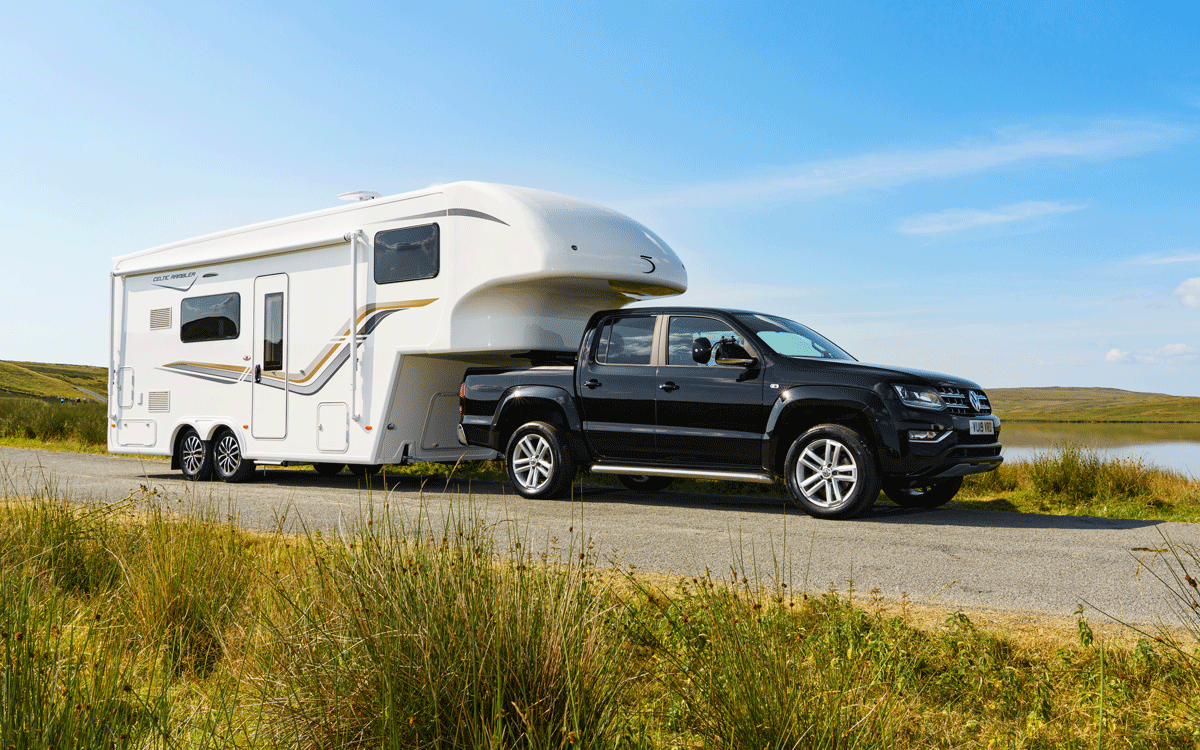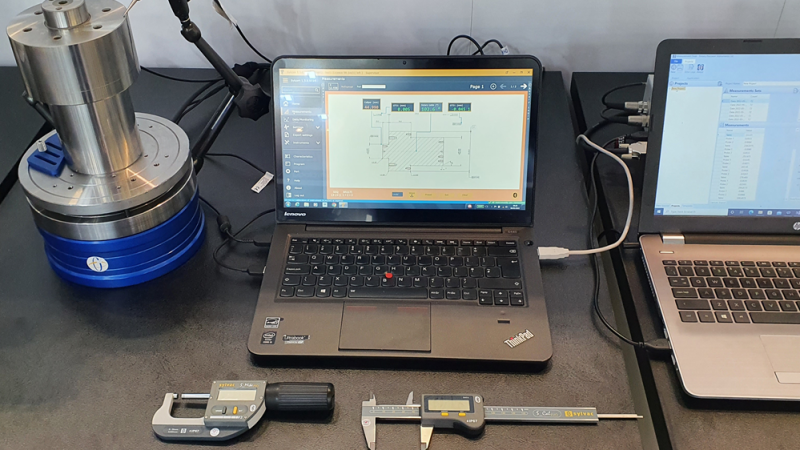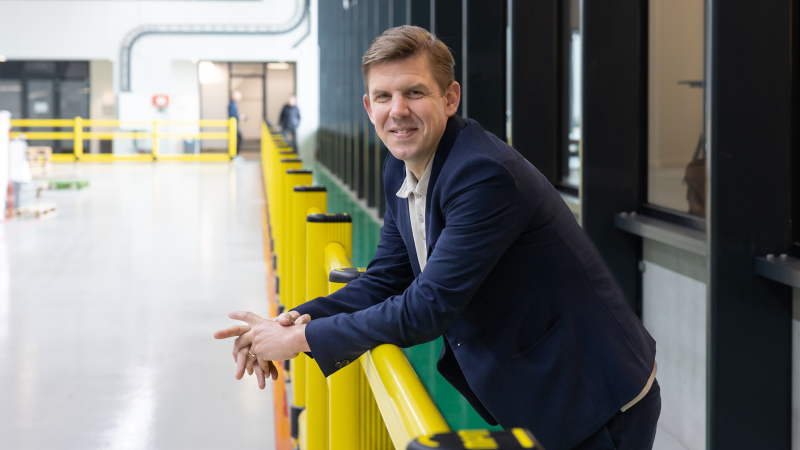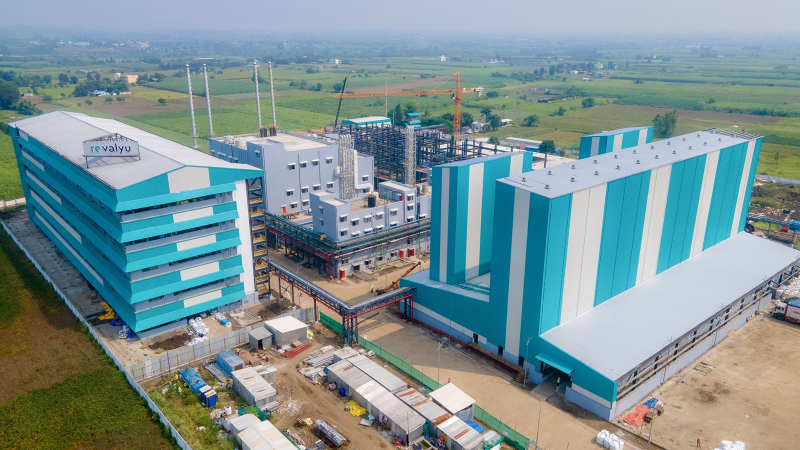The Fifth Wheel Company was founded in 1997 by Mervyn and Jenny Parry-Jones who ran a tractor dealership in North Wales. While selling the tractors, they had to visit trade shows, and that often meant needing somewhere to stay. They began taking a small caravan with them to these trade shows. Then, later, they purchased a 12 Ton American RV (Recreational Vehicle) But on a trip to America, they saw the fifth wheel caravans that were popular in the US and that changed everything.
Fifth wheel caravans take their name from the connection that tows the caravan – with the “fifth wheel” being the wheel in the mini-articulated lorry hitch that is integral to that connection.
“The fifth wheel concept is American, and because pick-up trucks are more popular in the US these models of caravan are more recognised over there,” explains Gethin Whiteley, Technical Director of The Fifth Wheel Company and the son-in-law of its founders.
While pick-up trucks have never been as popular in the UK as they have in the USA, the fifth wheel caravan design offers numerous advantages to British and European customers.
“The fifth wheel offers more size, space and towable weight to a conventional caravan and the towing method is safer and more stable,” Whiteley points out. “It is more practical than a motor home of the same size as you can leave the caravan behind and explore using the towing vehicle.”
Whiteley’s mother and father-in-law began to import these caravans to the UK, but the more they looked into it the more they found that US fifth wheel caravans simply were not built to UK and European manufacturing standards, so they purchased a farm and set about manufacturing the first ever fifth wheel caravans built in compliance with European standards.
“We took the American concept, but married it together with European manufacturing techniques,” Whiteley says.
Towing the Market
The Fifth Wheel Company had a unique market proposition, a new yet proven product, but it still faced the challenge of selling that product to a market that might not be ready yet to adopt.
“The feasibility of bringing this new towing method into the marketplace was our initial challenge,” Whiteley tells us. “At the same time the regulations and rules have been written around a set of standards developed over time, and there was nothing in those regulations to cover the fifth wheel method of towing.”
In the beginning the Fifth Wheel Company built exclusively for the UK market, and so only had UK regulations to adhere to, but as the export market to Europe became apparent the company had to adapt to achieve European regulatory approval.
“It was quite difficult jumping through hoops to get approval on couplings and fixings, the braking system, windows, you name it,” Whiteley says.
Customer Service
However, even with all those approvals, the offering that The Fifth Wheel Company provides to the British market goes beyond the type of caravan it takes its name from. The firm has also introduced a brand-new level of service for the caravanning market.
“The Fifth Wheel Company wants to make the customer service side of caravanning as a whole into something new,” says Whiteley. “A lot of the time it is like buying a car. You walk onto the lot and half an hour later you have signed the paperwork, and they say see you later.”
The model that The Fifth Wheel Company provides is quite different. The company’s dealership has a caravan park with its own restaurant on-site, Customers are encouraged to stay on the park so that they can get to know their unit while The Fifth Wheel Company are there to help. Customers can then come back annually to stay at the park, eat at the restaurant, and receive a servicing on their caravan.
“We are still a family business, we are still wholly owned, and we like to get across,” Whiteley says. “That when people buy our products, they are joining the Fifth Wheel family.”
The Fifth Wheel Family
Finding people to join that family on the staff-side has been another challenge in recent years. Positioned in North Wales, in a rural area, recruitment can be difficult, but the company has strong links with local colleges, which it draws on for apprenticeships.
The Fifth Wheel Company also has good links with the universities of Bangor and Glyndwr. That said, there is no one correct path into the business.
“One of our designers came here straight from GCSEs at school,” Whiteley recalls. “He didn’t want to do A-levels, so they completed Level 1 and Level 2 Engineering through the local college, and we put them through a degree at Glyndwr University which he completed with a first.”
Through the Fifth Wheel Company’s links with Bangor, it has ran live design projects, and another of the firm’s designers came into the business through that course before the Fifth Wheel Company funded his master’s program looking into composite materials.
This is not just about helping the Fifth Wheel Company’s staff develop their own CVs, it is also about bringing valuable skills, and even whole new capabilities into the business.
“Historically, we have been an assembly company, buying in components,” Whiteley says. “That has left us reliant on supply chains, and around ten years ago we decided we needed to get more control of those supply chains.”
The Fifth Wheel Company purchased equipment that would allow them to manufacture smaller panels, and when the pandemic disrupted its supply chain further the company acquired the ability to make larger wall panels using sandwiched composite wall panels of eight by three metres.
“We bought a vacuum press and a CNC to manufacture these panels in-house,” says Whiteley.
It is part of an ongoing process of improvement and development that has not stopped since the company’s founders first laid eyes on a fifth wheel caravan.
“Our vision for the future is to become more robust, bring more functions in-house from raw materials upwards so we’re less reliant on specialist suppliers while becoming more sustainable through export markets,” Whiteley tells us. “We currently sell direct in the UK with dealers in Germany and Austria. Europe is a bigger market than our UK market because pick-up trucks are more accepted out there, we are also looking at Australia and New Zealand.”
Ultimately, however, the company is dreaming even bigger than that.
“Eventually it would be nice to sell back to America to complete the loop!” he reveals.







